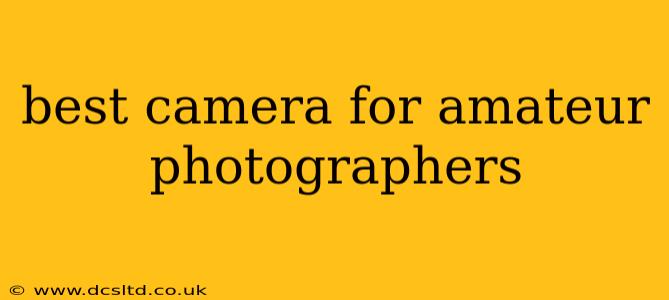Choosing your first camera can feel overwhelming. The market is flooded with options, each promising incredible results. This guide cuts through the noise, helping amateur photographers find the perfect camera to capture their vision. We'll explore various camera types, key features to consider, and answer frequently asked questions to help you make an informed decision.
What Type of Camera is Best for Beginners?
This is often the first hurdle. Do you go mirrorless, DSLR, or point-and-shoot? Each has its advantages and disadvantages:
-
Mirrorless Cameras: These are generally lighter, more compact, and offer excellent image quality. Many mirrorless cameras boast advanced features and intuitive interfaces, making them ideal for learning and growing as a photographer. They often have better video capabilities than DSLRs.
-
DSLR Cameras (Digital Single-Lens Reflex): While still popular, DSLRs are becoming less common. They're generally larger and heavier than mirrorless cameras. Their optical viewfinders offer a direct view of the scene, which some photographers prefer, but this technology is quickly being overtaken by the superior electronic viewfinders (EVFs) of mirrorless cameras.
-
Point-and-Shoot Cameras: These are compact, easy-to-use, and affordable. However, they offer less control over settings and generally produce lower-quality images than mirrorless or DSLRs. They're suitable for casual snapshots but lack the versatility for serious photography.
For amateur photographers starting their journey, a mirrorless camera is often the best recommendation. They provide a balance of ease of use, image quality, and future-proofing.
What Features Should I Look for in a Beginner Camera?
Beyond the camera type, several features are crucial for beginners:
-
Interchangeable Lenses: This allows you to adapt to different shooting situations, from portraits to landscapes. Start with a versatile kit lens and explore others as you develop your skills.
-
Intuitive Interface: A user-friendly menu system and easy-to-understand controls are vital, especially for beginners. Look for cameras with clear explanations and well-organized settings.
-
Good Image Stabilization: Image stabilization helps reduce blurry photos, especially in low-light conditions or when shooting handheld.
-
Autofocus System: A reliable and fast autofocus system is crucial for capturing sharp images, particularly when shooting moving subjects.
-
Wi-Fi and Bluetooth Connectivity: These features allow for easy image transfer to smartphones and computers, simplifying sharing and editing.
What is the Best Camera Brand for Beginners?
There isn't one "best" brand. Several reputable manufacturers offer excellent cameras for beginners:
-
Sony: Known for their innovative technology and high-quality image sensors.
-
Canon: A long-standing brand with a wide range of lenses and accessories.
-
Nikon: Another established brand offering a comprehensive system of cameras and lenses.
-
Fujifilm: Celebrated for their retro designs and excellent image quality.
The best brand for you will depend on your individual preferences and budget. Research different models from various brands to find one that suits your needs.
How Much Should I Spend on My First Camera?
The price range for cameras varies greatly. You can find decent entry-level mirrorless cameras in the $500-$1000 range, offering excellent value for money. Investing in a quality camera from the start can prevent you from upgrading too soon and helps you focus on learning photography fundamentals.
What Accessories Do I Need?
While the camera body is the core, a few accessories will significantly enhance your photography experience:
-
Extra Battery: Having a spare battery ensures you won't miss a crucial shot.
-
Memory Card: Choose a fast, high-capacity SD card to store your images.
-
Camera Bag: Protects your camera and accessories from damage.
-
Tripod: Useful for sharper images in low light and for long exposures.
Are there any good used cameras?
Buying a used camera can save you significant money. However, inspect it carefully for any damage or defects before purchasing. Reputable retailers often offer warranties on used equipment.
What's the difference between APS-C and Full-Frame sensors?
APS-C sensors are smaller than full-frame sensors, resulting in a shallower depth of field and a slightly cropped field of view. Full-frame sensors generally offer better low-light performance and image quality but are significantly more expensive. For beginners, an APS-C sensor is an excellent starting point, offering a great balance of image quality and affordability.
Choosing your first camera is an exciting step into the world of photography. By carefully considering these factors and researching different models, you can find the perfect camera to capture your creativity and embark on your photographic journey. Remember to practice regularly, experiment with different settings, and most importantly, have fun!
